FEATURED ARTICLES [Latest news updates]
 Papua New Guinea strips communal land rights protections, opening door to big business
Papua New Guinea strips communal land rights protections, opening door to big business
(06/30/2010) On May 28th the parliament in Papua New Guinea passed a sweeping amendment that protects resource corporations from any litigation related to environmental destruction, labor laws, and landowner abuse. All issues related to the environment would now be decided by the government with no possibility of later lawsuits. Uniquely in the world, over 90 percent of land in Papua New Guinea is owned by clan or communally, not be the government. However this new amendment drastically undercuts Papua New Guinea's landowners from taking legislative action before or after environmental damage is done. Essentially it places all environmental safeguards with the Environment and Conservation Minister.
 Uncovering the intelligence of insects, an interview with Lars Chittka
Uncovering the intelligence of insects, an interview with Lars Chittka
(06/29/2010) Many people would likely consider 'insect intelligence' a contradiction in terms, viewing insects—when they think of them as anything more than pests—as something like hardwired tiny robots, not adaptive, not intelligent, and certainly not conscious. However, research over the last few decades have shown that a number of well-studied insects are capable of performing amazing intellectual feats, from recognizing individuals to employing a symbolic language in a behavior known as a 'bee waggle'. "Already in 1900, Buttel-Reepen asked whether honeybees are mere reflex machines—and emphatically denied that claim," Dr. Lars Chittka, professor of Sensory and Behavioral Ecology at Queen Mary University in London, told mongabay.com in an interview. "Over the last century, we have seen a fundamental change in perspective on the learning capacities of insects, and there a now several credible lines of evidence that insects are capable of cognitive feats that had previously been ascribed only to 'higher' vertebrates".
_100.jpg) June issue of Tropical Conservation Science
June issue of Tropical Conservation Science
(06/28/2010) The latest issue of mongabay.com's peer-reviewed, scientific journal is now online. The issue contains papers on population growth around protected areas, threats to Uganda's Kibale National Park, Indian elephants, the use of invertebrates in Brazilian medicine, ecology of hippos in Burkina Faso, freshwater mollusks in Cub, Bolivian primates., and the wildlife assembled around a fruiting fig in Borneo.
 In Battle to Save Forests, Activists Target Corporations
In Battle to Save Forests, Activists Target Corporations
(06/24/2010) The image of rainforests being torn down by giant bulldozers, felled by chainsaw-wielding loggers, and torched by large-scale developers has never been more fitting: Corporations have today replaced small-scale farmers as the prime drivers of deforestation, a shift that has critical implications for conservation. Yet while industrial actors exploit resources more efficiently and cause widespread environmental damage, they also are more sensitive to pressure from consumers and green groups. As a result, activists have more power today than ever to affect corporate behavior and slow the dizzying pace of tropical deforestation worldwide. That power has been on display in recent months, as campaigns by environmental groups have forced major corporations to stop doing business with companies accused of widespread deforestation.
 Rainforest slaughter continues in Madagascar despite "ban" on timber exports
Rainforest slaughter continues in Madagascar despite "ban" on timber exports
(06/21/2010) New eyewitness reports indicate continued logging of Madagascar's Masoala National Park for rosewood despite a government "moratorium" on logging and timber exports. A source near Marofinaritra, a town between Masoala and Antalaha, reports heavy night-time movement of trucks carrying illegally logged timber from the park. The wood is believed to be destined for Antalaha, a regional hub for the rosewood trade.
 An interview with Rhett Butler
An interview with Rhett Butler
(06/16/2010) Rhett Butler, founder of Mongabay.com, spoke with Laurel Neme on her “The WildLife” radio show and podcast about what prompted him to develop this top environmental website and also about some of the more interesting and bizarre stories he’s pursued in Madagascar, the Amazon and around the world. Rhett founded Mongabay.com in 1999 with the mission of raising interest in and appreciation of wild lands and wildlife, while examining the impact of emerging local and global trends in technology, economics, and finance on conservation and development. Mongabay.com is an independent information source, not affiliated with any other organization.
 Indonesia's plan to save its rainforests
Indonesia's plan to save its rainforests
(06/14/2010) Late last year Indonesia made global headlines with a bold pledge to reduce deforestation, which claimed nearly 28 million hectares (108,000 square miles) of forest between 1990 and 2005 and is the source of about 80 percent of the country's greenhouse gas emissions. President Susilo Bambang Yudhoyono said Indonesia would voluntarily cut emissions 26 percent — and up to 41 percent with sufficient international support — from a projected baseline by 2020. Last month, Indonesia began to finally detail its plan, which includes a two-year moratorium on new forestry concession on rainforest lands and peat swamps and will be supported over the next five years by a one billion dollar contribution by Norway, under the Scandinavian nation's International Climate and Forests Initiative. In an interview with mongabay.com, Agus Purnomo and Yani Saloh of Indonesia's National Climate Change Council to the President discussed the new forest program and Norway's billion dollar commitment.
 Plight of the Bengal: India awakens to the reality of its tigers—and their fate
Plight of the Bengal: India awakens to the reality of its tigers—and their fate
(06/06/2010) Over the past 100 years wild tiger numbers have declined 97% worldwide. In India, where there are 39 tiger reserves and 663 protected areas, there may be only 1,400 wild tigers left, according to a 2008 census, and possibly as few as 800, according to estimates by some experts. Illegal poaching remains the primary cause of the tiger's decline, driven by black market demand for tiger skins, bones and organs. One of India's leading conservationists, Belinda Wright has been on the forefront of the country's wildlife issues for over three decades. While her organization, the Wildlife Protection Society of India (WPSI), does not carry the global recognition of large international NGOs, her group’s commitment to the preservation of tigers, their habitat, and the Indian people who live with these apex predators, is one reason tigers still exist.
 A total ban on primary forest logging needed to save the world, an interview with Glen Barry
A total ban on primary forest logging needed to save the world, an interview with Glen Barry
(06/02/2010) Radical, controversial, ahead-of-his-time, brilliant, or extremist: call Dr. Glen Barry, the head of Ecological Internet, what you will, but there is no question that his environmental advocacy group has achieved major successes in the past years, even if many of these are below the radar of big conservation groups and mainstream media. "We tend to be a little different than many organizations in that we do take a deep ecology, or biocentric approach," Barry says of the organization he heads. "[Ecological Internet] is very, very concerned about the state of the planet. It is my analysis that we have passed the carrying capacity of the Earth, that in several matters we have crossed different ecosystem tipping points or are near doing so. And we really act with more urgency, and more ecological science, than I think the average campaign organization."
 Timber certification is not enough to save rainforests
Timber certification is not enough to save rainforests
(06/02/2010) In the 1980s and 1990s pressure from activist groups led some of the world's largest forestry products companies and retailers to join forces with environmentalists to form the Forest Stewardship Council (FSC), a certification standard that aims to reduce the environmental impact of wood and paper production on natural forests. Despite initial skepticism on whether buyers would pay a premium for greener forest products, FSC quickly grew and by 2000 had become a standard in many markets, including Europe and the United States. Companies like Home Depot, Lowe's, and Ikea are today strong supporters of the FSC. But the FSC has not been without controversy. In recent years some activists have voiced concern about FSC standards as well as the credibility of auditors that certify timber operations. Among the initiative's supporters is the Rainforest Action Network (RAN), a group best known for its aggressive protest tactics. RAN says engagement with the FSC is better than the alternative: leaving the timber industry to devise its own sustainability standards.
Greener palm oil arrives in the United States
(06/29/2010) The first shipment of palm oil certified under sustainability criteria have arrived in the United States, according to the Roundtable on Sustainable Palm Oil (RSPO).
 Photos: rats drive island lizard to extinction
Photos: rats drive island lizard to extinction
(06/29/2010) The Selmunett lizard (Podarcis filfolensis ssp. Kieselbachi) is very likely extinct, according to Maltese naturalist Arnold Sciberras. One of four subspecies of the Maltese wall lizard, the Selmunett lizard was last seen in 2005. Although the lizard's home—Selmunett Island—has long been uninhabited by people, that fact did not help save the lizard. Over-predation by introduced rats is thought to be the primary cause of lizard's extinction.
 Photos: researchers uncover top priority areas for Bolivian primates
Photos: researchers uncover top priority areas for Bolivian primates
(06/28/2010) Employing a predictive model, researchers have located two areas in need of protection to ensure the survival of Bolivia's primate species. The study, published in Tropical Conservation Science, identified the potential distribution of Bolivia's 22 primates and discovered two priority regions, one in the Pando Department with a number of rare primates, and the other in Western Beni, home to two primate species that live no-where else.
Planting figs could save endangered species in Borneo
(06/28/2010) In one of the most remote and undisturbed forests of Borneo, the Maliau Basin in the Malaysian state of Sabah, researchers picked a single fig tree (Ficus caulocarpa)
and surveyed the species feeding from it over a 5-day-period. Their findings, published in Tropical Conservation Science, shows that a fig tree over a short period of time feeds a high percentage of endangered species, prompting researchers to recommend replanting figs in disturbed forests as a way to save Borneo's frugivores (fruit-eating species) from extinction.
 Saving one of West Africa's last hippo populations
Saving one of West Africa's last hippo populations
(06/28/2010) A new study in Tropical Conservation Science highlights the need for further conservation actions to save one of West Africa's last hippo populations, located in southern Burkina Faso. Researchers surveyed 41 hippos in the 'Mare aux Hippopotames' Biosphere Reserve of Burkina Faso in 2008, up by six individuals since 2006, but down from a population of 68 in 1985. The hippos (Hippopotamus amphibious) remain threatened by possible conflict with locals and the fact that a number of their ponds are outside the protected area.
Long-ignored freshwater mollusks in Cuba under threat
(06/28/2010) Among biologists, Cuba is famous for its diversity of mollusks with some 3,000 species, including the fact that over 90 percent of its land snails live no-were else. Given this, it's not surprising that Cuba is known as the 'paradise of malacologists' (scientists who study mollusks). However, one type of mollusk has been largely ignored in Cuba: freshwater. A new study in Tropical Conservation Science hopes to remedy that.
Invertebrates in Brazilian traditional medicines
(06/28/2010) According to a new study in Tropical Conservation Science a surprising number of invertebrates are used in Brazilian traditional medicines, which are popular both in rural and urban areas. Researcher discovered that at least 81 species from five taxonomic groups are being used to treat a variety of illnesses in Brazil.
Forest loss occurring around Kibale National Park in Uganda
(06/28/2010) A new study in Tropical Conservation Science finds that Kibale National Park in Uganda has retained its tropical forest despite pressures of a dense human population and large-scale clearing activities just beyond the border of the park. Home to twelve primate species, including Chimpanzees, the park is known as a safe-haven for African primates.
How do Asian elephants survive in fragmented and unprotected landscapes?
(06/28/2010) A new study in Tropical Conservation Science has found that Asian elephants living in a combination of fragmented forests and agricultural landscapes still depend on natural landscapes—rivers and forests—for survival. Following two herds of Asian elephants (Elephas maximus) in the Valparai plateau among the Anamalai Hills of India for three years, researchers found that the elephants spent much of their time, relative to their availability, near rivers and amid forest fragments. When they entered agricultural landscapes they preferred Eucalyptus and coffee to tea.
Conservation catch-22: do nature reserves attract human settlers?
(06/28/2010) Does the creation of protected areas draw people to settle on their fringes, negatively impacting ecosystems and biodiversity? According to an opinion piece in Tropical Conservation Science the answer to this question is to date unknown.
 Tiger farming and traditional Chinese medicine
Tiger farming and traditional Chinese medicine
(06/27/2010) The number of wild tigers has plummeted from 25,000-30,000 animals 50 years ago to around 3,200 today. A large part of the drop is from habitat loss and fragmentation. Tiger habitat has been reduced by 40 percent over the last decade, and tigers now occupy less than 7 percent of their historical range. Poaching has also contributed significantly to these dramatic population declines, particularly to supply parts for use in traditional medicine. In an interview with Laurel Neme, Grace Ge Gabriel, Asia Regional Director for the International Fund for Animal Welfare (IFAW), notes that, although the Chinese government has made significant efforts to reduce demand for tiger products by eliminating tiger bone from the official pharmacopeias, raising consumer awareness and identifying cheaper and more effective herbal alternatives to tiger bone for use in TCM, tiger farms threaten to reopen demand for tiger products by breeding tigers excessively, stockpiling tiger carcasses, and stoking demand by making and selling wine made from tiger bone.
Interview with a conservation giant from India
(06/27/2010) It is perhaps sacrilegious to squeeze all the achievements of the Wildlife Trust of India Chairman, Dr M K Ranjitsinh in one short profile note. A scion of the former royal family of Wankaner in Saurashtra, Gujarat, he is one of the most distinguished and accomplished wildlifers in India and indeed the world. Named after the famous cricketer, Dr Ranjitsinh has led a peripatetic and multifarious life that has seen him make full use of his multi talented personality.
 Ending deforestation could boost Brazilian agriculture
Ending deforestation could boost Brazilian agriculture
(06/26/2010) Ending Amazon deforestation could boost the fortunes of the Brazilian agricultural sector by $145-306 billion, estimates a new analysis issued by Avoided Deforestation Partners, a group pushing for U.S. climate legislation that includes a strong role for forest conservation. The analysis, which follows on the heels of a report that forecast large gains for U.S. farmers from progress in gradually stopping overseas deforestation by 2030, estimates that existing Brazilian farmers could see around $100 billion from higher commodity prices and improved access to markets. Meanwhile landholders in the Brazilian Amazon—including ranchers and farmers—could see $50-202 billion from carbon payments for forest protection.
Most climate change doubters lack expertise
(06/25/2010) An analysis of the scientific prominence and expertise of climate researchers shows that the few who are unconvinced of human-caused climate change rank far below researchers who are convinced. Most news media accounts fail to include that context when reporting claims from the doubters.
Scientists warn that Malaysia is converting tropical forests to rubberwood plantations
(06/24/2010) The Association for Tropical Biology and Conservation (ATBC) has condemned Malaysia's booming practice of converting tropical forests into rubberwood plantations, arguing that the conversion threatens Malaysia's biodiversity, endangered species, and releases significant greenhouse gas emissions.
Rainforest scientists urge UN to correct "serious loophole" by changing its definition of 'forest'
(06/24/2010) The Association for Tropical Biology and Conservation (ATBC) has released a resolution urging the UN to change its definition for 'forest', before the controversial definition undermines conservation efforts, biodiversity preservation, carbon sequestration, and the nascent REDD (Reducing Emissions through Deforestation and forest Degradation).
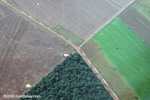 U.S. farms and forests report draws ire in Brazil; cutting down the Amazon does not mean lower food prices
U.S. farms and forests report draws ire in Brazil; cutting down the Amazon does not mean lower food prices
(06/24/2010) Not surprisingly, a US report released last week which argued that saving forests abroad will help US agricultural producers by reducing international competition has raised hackles in tropical forest counties. The report, commissioned by Avoided Deforestation Partners, a US group pushing for including tropical forest conservation in US climate policy, and the National Farmers Union, a lobbying firm, has threatened to erode support for stopping deforestation in places like Brazil. However, two rebuttals have been issued, one from international environmental organizations and the other from Brazilian NGOs, that counter findings in the US report and urge unity in stopping deforestation, not for the economic betterment of US producers, but for everyone.
The illegal logging cycle in Madagascar
(06/23/2010) The latest issue of the journal Madagascar Conservation & Development provides a comprehensive look into Madagascar's illegal logging trade, which has generated more than $200 million for a small group of individuals over the past year. The trade, which spikes just prior to national elections and may be a source of funds for ruling politicians, has taken a heavy toll on the lowland rainforests of Madagascar, with targeted species now at risk of extinction.
Massive forest loss spurs Nepal to ban logging for two months
(06/23/2010) Nepal has announced a two month ban on logging throughout the mountainous country, reports the AFP. The ban was issued after officials received reports of alarming deforestation in lowland areas; according to one official over 100,000 hectares (250,000 acres) of forest was lost in a few months, more forest than was lost from 2000-2005.
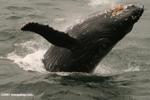 Whaling talks break down: ban stays in place, yet whaling will continue
Whaling talks break down: ban stays in place, yet whaling will continue
(06/23/2010) The International Whaling Commission (IWC), which was supposed to decide a way forward for whales over the next decade has ended without an agreement. Talks broke down, according to participants, because countries opposed to whaling and those that continue hunting and killing whales despite a ban on commercial whaling—i.e. Japan, Norway, and Iceland—have been unable to find enough common ground to pound out an agreement.
Violence at indigenous logging blockade in Borneo
(06/21/2010) A road blockade organized by Penan tribesmen in Malaysian Borneo turned violent over the weekend when a timber company official allegedly struck a native protester, reports the Bruno Manser Fund. Malaysian state police, who arrived in logging company vehicles, subsequently told the Penan to dismantle their blockade, which was established to protest continued logging of rainforest lands.
 New plan to save the chimpanzee from extinction
New plan to save the chimpanzee from extinction
(06/21/2010) Humankind's closest relative, the chimpanzee, is classified as Endangered by the IUCN Red List. Threatened by habitat and forest loss, hunting for bushmeat, trafficking for the illegal pet trade, mining, and disease, the species remains in a precarious position. Yet a new 10-year-plan with East and Central African hopes to ensure the chimpanzee's (Pan troglodytes) survival. The plan, which focuses on one subspecies of four, the eastern chimpanzee (Pan troglodytes schweinfurthii), pushes for the conservation of 16 core areas that would protect 96 percent of the eastern chimpanzee population.
Amazongate fraud
(06/21/2010) The Sunday Times over the weekend retracted a column that accused the Intergovernmental Panel on Climate Change (IPCC) of making a "bogus rainforest claim" when it cited a report warning that up to 40 percent of the Amazon could be "drastically" affected by climate change. The "Amazongate" column, authored by Jonathan Leake, Science & Environment Editor of the Sunday Times, was immediately seized upon by climate skeptics as further evidence to discredit the IPCC just two weeks after it was found to be using shoddy glacier data in its 2007 climate assessment. But now the Sunday Times has removed Leake's column from its web site and issued on apology, admitting that the Amazon claim was indeed supported by scientific research. The Sunday Times also acknowledged misconduct in the way one of the story's sources—Simon Lewis of the University of Leeds in Britain—was quoted.
Environmentalists and indigenous groups condemn plan for six dams in Peruvian Amazon
(06/21/2010) Environmentalists and indigenous groups have come together to condemn a 15 million US dollar plan for six hydroelectric dams in the Peruvian Amazon, signed last week by Brazilian President Luiz Inácio Lula da Silva and Peruvian President, Alan Garcia. While the six dams would produce over 6,000 megawatts, mostly for Brazil, critics say the dams will flood tens of thousands of hectares of rainforest, devastate the lifestyles of a number of indigenous groups, and only serve big Brazilian corporations.
Methane and Climate Change: From the Amazon to the Gulf of Mexico
(06/20/2010) In surveying the environmental damage unleashed from the BP oil spill, could we be missing the 800-pound gorilla in the closet? While oil poses undeniable ecological risks, methane (CH4) could prove daunting as well. As it turns out, crude which is destroying the Gulf of Mexico contains about 40 percent methane which may suffocate marine life and create vast “dead zones” where oxygen becomes so depleted that nothing is allowed to live.
Saving tropical forests helps protects U.S. agriculture, argues campaign
(06/18/2010) Reducing deforestation abroad helps protect the U.S. agricultural sector by ensuring higher prices for commodities and reducing the cost of compliance with expected climate regulations, argues a new report issued by Avoided Deforestation Partners, a group pushing for the inclusion of tropical forests in domestic climate policy, and the National Farmers Union, a farming lobby group.
New protected areas established in Brazil's fragmented Atlantic Forest
(06/17/2010) Brazil has designated an additional 65,070 hectare (161,000 acres) of land to be protected in the Mata Atlantica, or Atlantic Forest. The land is split between four new protected areas and an expansion of a national park.
Local voices: frustration growing over Senate plan on Tongass logging
(06/17/2010) Recently local Alaskan communities were leaked a new draft of a plan to log 80,000 acres of the Tongass forest making its way through the US Senate Energy and Natural Resources committee. According to locals who wrote to mongabay.com, the draft reinforced their belief that the selection of which forests to get the axe has nothing to do with community or environmental concerns.
UN warns food prices could rise by 40 percent
(06/17/2010) Some staple food prices could rise by as much as 40 percent in the next decade, according to a new report by the UN's Food and Agriculture Organization (FAO).
EU set to ban illegal timber by 2012
(06/17/2010) In two years the EU will begin a ban on importing illegal timber products, reports the BBC. The ban will require companies to have proof that their products do not come from illegally logged sources.
Amazon logging industry declines
(06/17/2010) The global economic crisis and increased environmental law enforcement have taken a toll on the Amazon logging industry in Brazil, reports a major new assessment conducted by Imazon and the Brazilian Forest Service.
Deforestation in Amazon increases malaria incidences by nearly 50 percent
(06/16/2010) A new study shows that deforestation in the Amazon helps spread disease by creating an optimal environment for malaria-carrying mosquitoes. The study, published in the online issue of the CDC journal Emerging Infectious Diseases, found that clearing forests in the Brazilian Amazon raised incidences of malaria by almost 50 percent.
Wildlife-rich river threatened by sand-dredging in Borneo
(06/15/2010) The Kinabatangan River in Malaysian Borneo is home to a fabulous wealth of species, including orangutans, proboscis monkeys, and a sizeable population of the world's smallest elephant, the Borneo pygmy elephant. While local politicians have stated numerous times that the ecology of the river will be protected, locals are reporting a number of legally sanctioned sang dredging operations on the river. Dredging can affect river flows, negatively impact wildlife, and release toxins from the sediments.
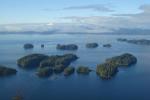 Photos: Tongass logging proposal 'fatally flawed' according to Alaskan biologist
Photos: Tongass logging proposal 'fatally flawed' according to Alaskan biologist
(06/15/2010) A state biologist has labeled a logging proposal to hand over 80,000 acres of the Tongass temperate rainforest to Sealaska, a company with a poor environmental record, 'fatally flawed'. In a letter obtained by mongabay.com, Jack Gustafson, who worked for over 17 years as a biologist with the Alaska Department of Fish and Game, argues that the bill will be destructive both to the environment and local economy.
Swiss giant orders investigation into its largest palm oil supplier
(06/15/2010) Migros, Switzerland's largest supermarket chain, will lodge a formal complaint against Malaysia's IOI Group after the palm oil grower was linked to illegal forest-clearing and encroachment on customary lands, reports the Bruno Manser Fund.
Voluntary carbon markets plunge in 2009
(06/15/2010) Battered by a faltering world economy and lack of progress on U.S. climate legislation, voluntary carbon markets declined by nearly every measure in 2009, according to the fourth annual State of the Voluntary Carbon Market Report issued today by Ecosystem Marketplace and Bloomberg New Energy Finance.
Deforestation on the rise again in Brazil
(06/14/2010) Deforestation in the Brazilian Amazon may be on the rise again after reaching record-low levels last year, reports Brazil's National Space Research Institute, INPE.
Australian rainforest plant yields possible cancer killer
(06/14/2010) A drug derived from a plant native to the Australian rainforest may prove to be a new weapon against cancer, according to the AFP. QBiotics Ltd has released a statement announcing that a drug made from the seeds of a rainforest shrub has successfully treated tumors in over 150 animals, and the company is now preparing to test the drug on humans.
When nature saves your life
(06/14/2010) If someone saves your life, you want to express your gratitude however you can -- a gesture, a "thank you,", or somehow returning the favor. Yet when you owe your life to a plant found thousands of miles away, the task becomes much harder. As a nurse, I’ve known for years that many life-saving medicines come from plants and animals found around the world. But I never thought that one day I would have to rely on the bark of a rare Asian tree to survive.
Poachers kidnap and murder ranger in India
(06/14/2010) A forest guard (i.e. ranger) in Orang National Park paid the ultimate price for protecting wildlife last week. Hassan Ali was found with two bullets in his stomach after being kidnapped by four men allegedly connected to poaching operations targeting the park.
New UN panel to focus on saving life on Earth
(06/14/2010) In South Korea last week 230 delegates from 85 nations approved a new UN science panel focusing on saving life on Earth, known as the Intergovernmental Science Policy Platform on Biodiversity and Ecosystem Services (IPBES). The panel, which is to be modeled off of the Intergovernmental Panel on Climate Change (IPCC), is meant to bridge the gap between scientific understanding of biodiversity loss and the policy decisions necessary to stop it.
Inga alley cropping: a sustainable alternative to slash and burn agriculture
(06/14/2010) It has been estimated that as many as 300 million farmers in tropical countries may take part in slash and burn agriculture. A practice that is environmentally destructive and ultimately unstable. However, research funded by the EEC and carried out in Costa Rica in the late 1980s and early 1990s by Mike Hands offers hope that it is possible to farm more successfully and sustainably in these tropical regions.
 Borneo's lush forests are an illusion: trees grow on deserts
Borneo's lush forests are an illusion: trees grow on deserts
(06/14/2010) The lush green rainforests of Central Kalimantan (Indonesian Borneo) grow on a desert. The illusion of organic richness and bounty is nowhere stronger than in these coastal jungles and mangroves, swamps and heath forests. The soaring trees and dizzying diversity of flora and fauna suggest that there are reserves of energy and life stored somewhere in the land, and all the living organisms draw on this infinite reserve. Nothing could be further from the truth.
 Using art to promote conservation
Using art to promote conservation
(06/14/2010) Pollyanna Pickering is widely recognized as one of Europe's foremost wildlife artists, and is one of the most published fine artists working in Britain today. She is an honorary patron of The Wildlife Art Society International, and a signature member of the Artists for Conservation Foundation and the Society of Feline Artists. She is also a full juried member of the New York based Society of Animal Artists. A familiar face on TV, the most recent documentary about her work Made in England was broadcast on BBC1 last year.
Indonesian government's promise up in smoke: fires rise by 59 percent
(06/13/2010) The Indonesian government failed to live up to its promises to reduce fires across the tropical nation last year. Instead a 2009 State Environment Report showed a 59 percent rise of fire hotspots from 19,192 in 2008 to 32,416 last year, as reported by The Jakarta Post.
 Fishermen express doubts about coal plant overlooking their fishing grounds
Fishermen express doubts about coal plant overlooking their fishing grounds
(06/13/2010) Local fishermen in the Malaysian state of Sabah are uncertain of their future, if the government pushes ahead to build a 300 megawatt coal power plant. They have been told they will be moved from their current seaside village to one deeper inland, and while the coal plant will provide manual labor work in its building stages, the fishermen express doubt about the impacts over the long-term effects of the coal plant on their livelihood. "Someone mentioned that maybe we have to move to Sungai Merah, which is quite far from our village. We are also worried because Sungai Merah is not next to the sea like [our village] is," local fishermen, Ali Hia, told Green SURF and Save Sandakan members—two local organizations opposed to the coal plant—who recently visited the seaside village of Kampung Sinakut, site of the proposed coal plant.
 To save species, Malaysia implements daring plan to trap wild Bornean rhino
To save species, Malaysia implements daring plan to trap wild Bornean rhino
(06/13/2010) With less than 40 individuals left in the world, the Bornean rhino is a small step away from extinction. Yet conservationists and government officials in the Malaysian state of Sabah are not letting this subspecies of the Sumatran rhino go without a fight. Implementing a daring last-ditch plan to save the animal, officials are working to capture a wild female to mate with a fertile male named Tam, who was rescued after wandering injured into a palm oil plantation two years ago.
12,000 Critically Endangered antelopes found dead
(06/10/2010) The Ural population of the Critically Endangered saiga, a curious-looking Asian antelope, has been decimated by an unknown assailant. 12,000 saigas, mostly females and their calves, were found dead in western Kazakhstan reports the Saiga Conservation Alliance.
Senate blocks attempt to strip EPA of power to regulate CO2 emissions
(06/10/2010) The U.S. Senate killed an effort to prevent the Environmental Protection Agency (EPA) from regulating greenhouse gas emissions.
 The penguin crisis: over 60 percent of the world's penguins threatened with extinction
The penguin crisis: over 60 percent of the world's penguins threatened with extinction
(06/10/2010) Everyone loves penguins. With their characteristic black-and-white 'tuxedo' markings, upright waddle, and childlike stature, penguins seem at once exotic and familiar: exotic because they live far from most human habitations, familiar because they appear innumerable books and movies. From Mr. Popper's Penguins to Happy Feet, and from March of the Penguins to And Tango Makes Three, penguins pop-up everywhere. The flightless birds have even provided the name and symbol to one of the world's most successful publishing houses. Yet despite their popularity amid the human kingdom, few people seem aware that penguins worldwide are facing an extinction crisis.
Massive forest carbon scam alleged in Liberia
(06/10/2010) Liberian President Ellen Johnson Sirleaf established a commission investigate a proposed forest carbon credit deal between the West African nation's Forest Development Authority (FDA) and UK-based Carbon Harvesting Corporation, reports Global Witness, an NGO that originally raised concerns about the scheme, which aimed to secure around a fifth of Liberia's total forest area — 400,000 hectares — in a forest carbon concession.
EU mandates biofuel environmental standards to protect forests, wetlands
(06/10/2010) The E.U. today moved to establish environmental standards for biofuels used in Europe, requiring biofuels to deliver "substantial reductions" in greenhouse gas emissions and not result in conversion of forests or wetlands, according to a statement from the European Commission.
Peatlands restoration wins support in effort to reduce carbon emissions
(06/10/2010) The body charged with establishing a framework for a global climate treaty will account for emissions from peatlands degradation, a source of roughly 6 percent of greenhouse gas emissions. The decision by the Intergovernmental Panel on Climate Change (IPCC) lays the groundwork for new measures to protect and restore wetlands, says Wetlands International.
 Madagascar resumes shipments of illegally logged timber despite moratorium
Madagascar resumes shipments of illegally logged timber despite moratorium
(06/10/2010) Albert Camille Vital, Madagascar's Prime Minister under the regime that seized power during a coup on the Indian Ocean island nation last year, approved this week's shipment of nearly $16 million worth of timber illegally logged from the country's rainforest parks, according to documents provided to mongabay.com.
Study points to global snake decline
(06/09/2010) A number of reports over the last decade have shown amphibians, lizards, fish, and birds facing steep population declines across species and continents, providing further evidence that the planet is undergoing a mass extinction. Now a new study in Biology Letters adds another group of animals to that list: snakes.
Quota filled, bluefin tuna hunt ends early
(06/09/2010) The European Commission (EC) has announced an early end to the Atlantic bluefin tuna season since the quota of 13,500 tons has been met. The fishing will end at 11:59 tonight GMT.
Reporting on deforestation, pollution is dangerous
(06/09/2010) Journalists who report on deforestation and pollution are increasingly at risk of violence, imprisonment, or persecution, finds a new report released last week by Reporters Without Borders.
Anglican Church says overpopulation may break eighth commandment
(06/08/2010) In a bold move for a Christian church, Australia's Anglican Church has linked overpopulation to the eighth commandment given to Moses on Mount Sinai: 'Thou shall not steal', according to The Age.
Already on the edge, lemurs could become victims of climate change
(06/08/2010) Expanding beyond well-known victims such as polar bears and coral reefs, the list is growing of species likely to be hard hit by climate change: from lizards to birds to amphibians. Now a new study has uncovered another group of species vulnerable to a warmer world: lemurs.
Internship with mongabay.com for summer 2010
(06/08/2010) Mongabay is seeking a part-time summer intern to post articles in non-English languages; manage relationships with volunteer translators; and update the "Translators for Forests" Facebook page, including posting links and tracking progress on translated articles.
 Will we ever know the full wildlife toll of the BP oil spill?
Will we ever know the full wildlife toll of the BP oil spill?
(06/08/2010) Will we ever know the full wildlife toll of the BP oil spill? The short answer: no. The gruesome photos that are making the media rounds over the last week of oiled birds, fish, and crustaceans are according to experts only a small symbol of the ecological catastrophe that is likely occurring both in shallow and deep waters. Due to the photos, birds, especially the brown pelican, have become the symbol of the spill to date. But while dozens of birds have been brought to rescue stations covered in oil, the vast majority will die out at sea far from human eyes and snapping cameras, according to Sharon Taylor a vet with the US Fish and Wildlife Service.
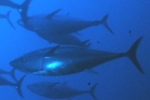 The bluefin tuna wars: Greenpeace and Sea Shepherd step up tactics to save Critically Endangered species
The bluefin tuna wars: Greenpeace and Sea Shepherd step up tactics to save Critically Endangered species
(06/07/2010) Things have become ugly in the Mediterranean: over the weekend, fishermen and Greenpeace activists squared off over the fate of the Critically Endangered bluefin tuna. One run-in, in which Greenpeace worked to free tuna from fishermen's nets, left one activist in the hospital after a fisherman sunk a hook in the activist's leg. Meanwhile, the Sea Shepherd Conservation Society has announced a 'Blue Rage' campaign that will target illegal fishing of bluefin tuna.
Gabon's bans log exports
(06/07/2010) On May 15th the West African nation of Gabon implemented a total ban on log exports. According to the International Timber Trade Organization (ITTO) the ban has been efficiently enforced to date and log exports from Gabon have "completely halted".
Second Act for South America: Are Greens the Answer?
(06/07/2010) Having overstated the political potency of Colombia’s Green Party, I've felt a bit shame faced in recent days. In the Andean nation's first presidential runoff election, Green Party candidate Antanas Mockus garnered more than 20% of the vote, which allowed him to proceed to the second round on June 20th. But while the news was certainly encouraging for environmentalists across South America, Mockus' electoral performance failed to live up to expectations.
Indonesia identifies possible sites for forest conservation pilot project
(06/06/2010) The government of Indonesia has named four forests which could serve as pilot projects for its conservation deal with Norway, according to the Jakarta Post. The deal, including a billion US dollar donation from Norway, is meant to help Indonesia stem rampant deforestation throughout the nation, which has pushed Indonesia to become the world's third highest greenhouse gas emitter.
 Two new frogs discovered in Panama amidst amphibian plague
Two new frogs discovered in Panama amidst amphibian plague
(06/06/2010) Researchers working to save Panama's frogs from a fatal disease have stumbled on two species unknown to science. In Omar Torrijos National Park they found a bigger version of a common species, which is now known to be a unique species, and near the Colombian border they discovered a new frog that has been named after Spanish for DNA. Both frogs were discovered while researchers searched for frog populations in chytridiomycosis-infected areas. The highly contagious disease chytridiomycosis has devastated frog species worldwide and is believe to be at least in part responsible for some 100 extinctions of amphibians.
Saltwater crocodiles surf across the ocean
(06/06/2010) Despite being poor swimmers, researchers have discovered that the saltwater crocodile (also known as estuarine) commonly travels long distances over open oceans by riding ocean currents. The discovery, published inJournal of Animal Ecology, solves an unknown mystery of why saltwater crocodiles (Crocodylus porosus) are found across vast distance in the Pacific, yet have not diverged into different species.
 REDD threatens rights of 350 million local people
REDD threatens rights of 350 million local people
(06/03/2010) Last week the Reducing Emissions from Deforestation and Forest Degradation (REDD) program received a jump start with a four billion US dollar pledge from a number of industrialized nations. Under REDD tropical forest nation will be paid to keep forests standing, however the program—as it currently stands—has provoked concern over the rights of the some 350 million people living in or adjacent to forests. The Accra Caucus on Forests and Climate Change, a coalition of some 100 organizations from 38 countries, has released a report outlining an alternative vision of REDD that would uphold the rights of local and indigenous people while protecting forests.
Confusion in Indonesia over forestry licenses and conservation deal with Norway
(06/03/2010) Indonesia's chief economic minister said on Wednesday that the government will not revoke existing forestry licenses to develop natural forests under a billion dollar conservation deal signed last week with Norway.
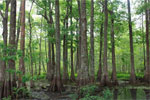 Before the oil spill (photos)
Before the oil spill (photos)
(06/03/2010) With the BP oil spill continuing unabated into the 2010 Atlantic hurricane season, fears are rising that a major storm could dramatically worsen the impact of the disaster, which has already been called the worst in U.S. history. Forecasters are predicting 14 to 23 named storms this year, of which 3 to 7 will turn into major hurricanes. According to forecasters Philip Klotzbach and William Gray of Colorado State University, there is a 43 percent chance that Louisiana will be hit by a hurricane.
French company to break moratorium on shipments of illegally logged rosewood from Madagascar
(06/03/2010) SEAL, a French transport company, is scheduled to ship 79 containers of rosewood tomorrow from the port of Toamasina on its vessel Terra Bona, reports Midi Madagascar. The shipment comes less than three months after Madagascar's ruling authority banned timber exports after international uproar over the organized logging of the country's national parks in the aftermath of last year's military coup. SEAL's shipment of timber will be in direct violation of the moratorium.
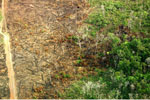 As Amazon deforestation rates fall, fires increase
As Amazon deforestation rates fall, fires increase
(06/03/2010) While rates of forest loss in the Brazilian Amazon have been on the decline since 2004, the incidence of fire is increasing in the region, undermining some of the carbon emissions savings of reduced deforestation rates, report researchers writing in the journal Science. The paper argues that REDD, a global plan to reduce deforestation and forest degradation, must include measures to eliminate the use of fire from land management in the Amazon.
Corruption could undermine REDD
(06/03/2010) With four billion US dollars pledged last week to kick-start the Reduced Emissions from Deforestation and Forest Degradation (REDD), a new report by Global Witness warns that the funds could do little to stem deforestation if governance and accountability are not improved and corruption tackled. The REDD program provides funds to tropical nations to keep forests standing as a means to sequester carbon.
As Mangroves Die from Oil, U.S. Public Yawns
(06/03/2010) What if, instead of a nasty oil disaster in the Gulf of Mexico, the U.S. public was now confronted with a natural catastrophe in the Grand Canyon or in California Redwood forests? Within the popular imagination, certain types of ecosystems elicit more sympathy than others, and very low on the totem pole are mangrove forests. Located in the tropics, mangroves are a mess of thick, tangled salt-tolerant trees and shrubs which thrive in brackish tidal waters. When I paddled through the Florida Everglades in a canoe some fifteen years ago, I found mangroves bizarre looking: trees have long roots which stick out above the water level.
NASA satellite image reveals record low snow for the United States
(06/02/2010) According to the National Oceanic and Atmospheric Administration, snow cover retreated to its lowest extent ever recorded in North America by the end of this April. Snow cover was 2.2 million square kilometers below average. With records of snow extent beginning in 1967, this is the lowest in 43 years and the largest negative anomaly in the past 521 months.
Children's books about rainforests linked to rainforest destruction
(06/01/2010) Purchasing a book children's book may be directly causing deforestation of biodiverse and carbon-heavy rainforests, according to a new report by the Rainforest Action Network (RAN). In a discovery that highlights the irony of the issue, RAN even found children's books about protecting rainforests contained fiber from Indonesian forests.
International alliance created to help corporations avoid illegal wood
(06/01/2010) Given the complexities of the global wood trade and the difficulty of deciphering a product's source of wood, the World Resources Institute (WRI), the Environmental Investigation Agency (EIA-US and the US Agency for International Development (USAID) have banded together to create a global initiative, the Forest Legality Alliance, to aid private corporations to reduce the trade in illegal wood. The alliance's formation comes after the US amended the Lacey Act in 2008 to ban the trade of illegal wood products in the US.
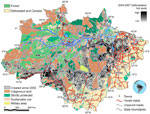 New protected areas in Brazil contribute to major drop in Amazon deforestation rate
New protected areas in Brazil contribute to major drop in Amazon deforestation rate
(06/01/2010) Protected areas in the Brazilian Amazon are proving highly effective in reducing forest loss in Earth's largest rainforest, reports a new study based on analysis of deforestation trends in and around indigenous territories, parks, military holdings, and sustainable use reserves. The research, published in the early edition of Proceedings of the National Academy of Sciences, finds that 37 percent of the recent decline in deforestation in the Brazilian Amazon can be attributed to newly established protected areas. Brazil designated some 709,000 square kilometers (274,000 sq mi) of Amazon forest — an area larger than the state of Texas — between 2002 and 2009 under its Amazon Protected Areas Program (ARPA). Meanwhile deforestation in the Brazilian Amazon fell by nearly three-quarters between 2004 and 2009.
Norway's billion dollar contribution to Indonesian forests excludes national reforestation scheme
(06/01/2010) Norway's billion dollar contribution to forest and peatlands conservation in Indonesia will not fund reforestation of deforested areas, a government minister told The Jakarta Post.
Most popular mongabay news articles for May
(06/01/2010) Most popular mongabay news articles for May 2010.
 Papua New Guinea strips communal land rights protections, opening door to big business
Papua New Guinea strips communal land rights protections, opening door to big business Uncovering the intelligence of insects, an interview with Lars Chittka
Uncovering the intelligence of insects, an interview with Lars Chittka _100.jpg) June issue of Tropical Conservation Science
June issue of Tropical Conservation Science In Battle to Save Forests, Activists Target Corporations
In Battle to Save Forests, Activists Target Corporations Rainforest slaughter continues in Madagascar despite "ban" on timber exports
Rainforest slaughter continues in Madagascar despite "ban" on timber exports An interview with Rhett Butler
An interview with Rhett Butler Indonesia's plan to save its rainforests
Indonesia's plan to save its rainforests Plight of the Bengal: India awakens to the reality of its tigers—and their fate
Plight of the Bengal: India awakens to the reality of its tigers—and their fate A total ban on primary forest logging needed to save the world, an interview with Glen Barry
A total ban on primary forest logging needed to save the world, an interview with Glen Barry Timber certification is not enough to save rainforests
Timber certification is not enough to save rainforests Photos: rats drive island lizard to extinction
Photos: rats drive island lizard to extinction Photos: researchers uncover top priority areas for Bolivian primates
Photos: researchers uncover top priority areas for Bolivian primates Saving one of West Africa's last hippo populations
Saving one of West Africa's last hippo populations Tiger farming and traditional Chinese medicine
Tiger farming and traditional Chinese medicine Ending deforestation could boost Brazilian agriculture
Ending deforestation could boost Brazilian agriculture U.S. farms and forests report draws ire in Brazil; cutting down the Amazon does not mean lower food prices
U.S. farms and forests report draws ire in Brazil; cutting down the Amazon does not mean lower food prices Whaling talks break down: ban stays in place, yet whaling will continue
Whaling talks break down: ban stays in place, yet whaling will continue  New plan to save the chimpanzee from extinction
New plan to save the chimpanzee from extinction Photos: Tongass logging proposal 'fatally flawed' according to Alaskan biologist
Photos: Tongass logging proposal 'fatally flawed' according to Alaskan biologist Borneo's lush forests are an illusion: trees grow on deserts
Borneo's lush forests are an illusion: trees grow on deserts Using art to promote conservation
Using art to promote conservation Fishermen express doubts about coal plant overlooking their fishing grounds
Fishermen express doubts about coal plant overlooking their fishing grounds To save species, Malaysia implements daring plan to trap wild Bornean rhino
To save species, Malaysia implements daring plan to trap wild Bornean rhino The penguin crisis: over 60 percent of the world's penguins threatened with extinction
The penguin crisis: over 60 percent of the world's penguins threatened with extinction Madagascar resumes shipments of illegally logged timber despite moratorium
Madagascar resumes shipments of illegally logged timber despite moratorium Will we ever know the full wildlife toll of the BP oil spill?
Will we ever know the full wildlife toll of the BP oil spill? The bluefin tuna wars: Greenpeace and Sea Shepherd step up tactics to save Critically Endangered species
The bluefin tuna wars: Greenpeace and Sea Shepherd step up tactics to save Critically Endangered species Two new frogs discovered in Panama amidst amphibian plague
Two new frogs discovered in Panama amidst amphibian plague  REDD threatens rights of 350 million local people
REDD threatens rights of 350 million local people Before the oil spill (photos)
Before the oil spill (photos) As Amazon deforestation rates fall, fires increase
As Amazon deforestation rates fall, fires increase New protected areas in Brazil contribute to major drop in Amazon deforestation rate
New protected areas in Brazil contribute to major drop in Amazon deforestation rate